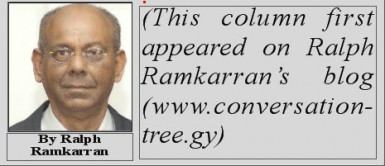Yesterday morning the Stabroek News reported that Plaisance businessman, Kenneth Earle, was shot twice and robbed of $4 million after leaving a city bank.
On Friday last the Kaieteur News reported that Curtis Vasconcellas was one of two suspects captured on the Wednesday before during a high speed chase by police after allegedly grabbing $2.5 million from a Hotel Tower accountant. A security guard was shot by one of the two suspects but the gun was not recovered.  The report reminded readers that during an attempted robbery on June 6, 2015, at Grove on the East Bank, the 22 year old Vasconcellas was shot in the neck and right arm and his 18 year old accomplice, Michael Grant, was shot and killed. They had allegedly attempted to rob Neezam Khan who, himself, was shot. According to the report, Vasconcellas, apparently refused bail by the Magistrate, was granted bail by the High Court “a few months ago.”
The report reminded readers that during an attempted robbery on June 6, 2015, at Grove on the East Bank, the 22 year old Vasconcellas was shot in the neck and right arm and his 18 year old accomplice, Michael Grant, was shot and killed. They had allegedly attempted to rob Neezam Khan who, himself, was shot. According to the report, Vasconcellas, apparently refused bail by the Magistrate, was granted bail by the High Court “a few months ago.”
On the same day the editorial in the Kaieteur News, entitled ‘Crime Soars,’ complained that, “there is, once again, a rising tide of concern about the increase in murders across our land.” In fact, the tide has been rising for decades.
The alarming capacity of criminals, in evidence from numerous incidents since 2002, was demonstrated when on Monday last a gang of 14 men, armed with AK-47 guns, invaded the home of No 79 Village, Corentyne, cambio dealer, Devendra Churaman, smashing his window grill with a sledge hammer and then smashing their way through a metal door into his bedroom. Mercifully, his life was spared but early reports said that he was robbed of some $20 million. While the robbery was going on some of the robbers positioned themselves on the road, with guns in hand, firing in the air to terrorise residents or to thwart any attempted intervention. No one is safe and no security measure would stop determined criminals.
Even though crime statistics reported by the police show a decline, it is not significant enough to make an impact on public safety or fear. The fact is that with the number of armed home invasions and almost weekly, armed robberies of persons who have withdrawn money from one of the banks, very few people in Guyana go to bed at night or go to the bank with any confidence that either their homes will not be invaded or they will not be shot and robbed after leaving the bank. There is no doubt that the Crime Chief and his team, no doubt with the support and committed effort of the Commissioner and police administration, have done a great all-round job and crime has declined. But violent crime is too extensive and persistent and criminals too brazen and well organized for any peaceful Guyanese to feel anything but fear.
There is no short-term solution to the crime situation. It is bred by poverty and lack of opportunity, at least in Guyana. When I said this in the past, five senior PPP government spokespersons, almost in unison, publicly denied it. I wonder what they will say now. But in more developed countries with serious crime problems, like Trinidad and Tobago, other factors would obviously be at play. In the medium term there is no indication that Guyana’s economic situation is likely to improve and, therefore, the crime situation will remain troubling.
Apart from the expansion of the Police Force and improvement of its quality by more training, short-term methods are necessary to keep criminals off the streets. These include granting greater custodial power to magistrates, which is limited. Alternatively, I have argued and repeat here, that legislation should be enacted to empower magistrates to refer convicted defendants to the High Court for sentencing where the magistrate feels that his or her custodial powers are inadequate. The last I remember it was three years. If it has been increased recently, such increase would be too minimal to affect my argument.
An additional and more important power is to refuse bail to defendants who commit certain crimes. For as long as I can remember there have been complaints about the release of defendants or accused persons on the streets after they are charged. Certainly, for an accused like Vasconcellas, he should never have been on the street to commit more robberies. The Magistrate thought so and refused bail. The High Court judge, no doubt acting on the principle that pretrial liberty is granted to all but murder accused, and that under normal circumstances a person charged is entitled to pretrial liberty, granted bail of $500,000. This is a clear case where bail ought to have been far higher. Vasconcellas was charged with attempted murder. Minister Ramjattan, who has complained before, once again yesterday said that persons like Vasconcellas should not be granted bail. But these words have repeatedly fallen on deaf ears. The simplest solution is to legislate to make armed robbery an offence which is not bailable. The government must act now. The public can wait no longer.





